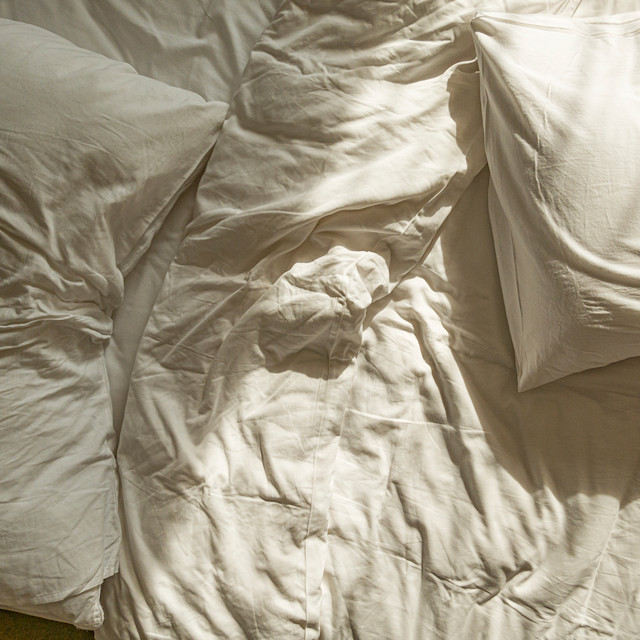Plus, other ways to improve your sleep this winter.
It’s not unusual for you to feel the impact of darker days on everything, from your mental health to your sleep hygiene, during the winter. While there’s not much you can do about the days getting shorter, there are improvements you can make to your routine to optimize your sleep.
“I think it's important to have proper sleep hygiene all year round, but the winter can wreak particular havoc on our systems,” explains Gina Moffa, LCSW, a licensed psychotherapist and author based in New York City. “It may seem that we need more sleep because the days are shorter; in fact, we need the same amount all year.”
Instead of burrowing into the depths of your couch, the key to feeling more well-rested lies in switching up your sleep routine to meet the current season. “It's important not to allow ourselves to bend to our desire for more sleep in the winter because this can mess with our circadian rhythm and melatonin,” says Moffa. “A number of sleep disorders have been linked to having our circadian rhythms out of whack.”
Ahead, discover a few adjustments you can make to your winter sleep routine to keep your deep sleep on track this season.
Embrace Unique Sleep Habits
If you share a bed with a loved one, you may want to consider trying out the Scandinavian Sleep Method. The method encourages partners to continue sharing a bed with one key change: incorporating two duvets (usually without a top sheet) instead of one to help regulate your preferred sleep temperature and avoid the inevitable tug of war in the middle of the night. Research has also found a connection between poor sleep and lack of conflict resolution between partners. Meanwhile, a restful night’s sleep has been found to increase the likeliness of a couple's empathic response during a conflict conversation.
RELATED: The Case for Practicing Yoga at Night
Be Intentional About Time Management
Summer is full of daylight, but it’s also packed with busyness. As the days get shorter, managing your time differently is one way to help support your sleep routine.
“As we start to settle into the colder, darker months of the year, it’s a good time to focus on more ‘yin’ behaviors — we should naturally be slowing down, focusing on rest, and becoming more reflective,” says Sarah Swanberg, Doctor of Acupuncture and Chinese Medicine and the co-founder of Indigo Wellness Group. “This is a great time to pick up journaling or try out some slower-moving activities like yin yoga.”
Focus On Your Circadian Rhythm
Your circadian rhythm — the natural process that regulates your sleep and wake cycles — rules your sleep, and tending to it can mean focusing on small habits that come way before bedtime.
“Seasonal changes can cause major disruption to our circadian rhythm, serotonin, and melatonin levels, simply due to shorter days. Waking up while it's still dark outside and ending work with it dark means the majority of the daylight we are inside and not getting enough sunshine,” says Moffa. “When our sleep is disrupted or the patterns change, it can cause our serotonin to drop, therefore causing more depressive symptoms. We tend to both want to go to sleep earlier, but also stay in bed later, because of the drop in hours with sunlight.”
Swanberg has an easy suggestion that can make a difference: “Reset your circadian rhythm by getting early morning sun exposure directly to your eyes. Getting 10 minutes of outside time in the morning (20 minutes on a cloudy day) helps set your system up for a proper cortisol/melatonin (hormones that control our sleep-wake cycles) shift in the evening.”
RELATED: Shift Your Bedtime with Circadian Science
Learn Which Scents Calm You
Swanberg is the author of Aromatherapy for Self-Care, and says curating your nighttime scent can help encourage better sleep at night. “Certain essential oils, such as lavender, chamomile, and bergamot, have natural anxiolytic (anti-anxiety) and sedative properties that can help calm the mind,” she says. “Clary sage, vetiver, and jasmine are popular sleep aid oils.”
But because scent is intrinsically tied to memory, playing with different scents and finding ones that don’t trigger negative or overwhelming feelings is key. Once you’ve landed on your favorite scent, you’re not limited to simply smelling it.
“A warm bath with Epsom salt and lavender can do double duty by helping your muscles relax, too,” says Swanberg. “Having a cup of chamomile tea in the evening can be a really nice ritual that gives you both the inhaled and ingested effects of chamomile. We prefer loose-leaf, organic teas.”
Turn to Other Tools on Darker Days
Sleepless nights can have ripple effects on mental health and mood. If you notice the darker days impacting you negatively, Moffa suggests seeking additional support, either with a therapist or with a tool like a light therapy box.
“Many people benefit from specialized light therapy boxes, which will emit bright light mimicking sunlight without the harmful UV rays,” shares Moffa. “Most of my clients use light therapy on an as-needed basis. If you see an improvement with light therapy, you can lessen or stop until you need to resume. It also helps to set a schedule for things you will do at the beginning of the day and things you will do at the end of the day that can be considered self-care for you.”
Invest in yourself with the exclusive Equinox x ŌURA Rest and Recovery Kit, which includes an Equinox branded ring cover, ring pouch, and a complimentary one-year subscription to the ŌURA app. Limited quantities available in the Equinox Shop. Buy Now
